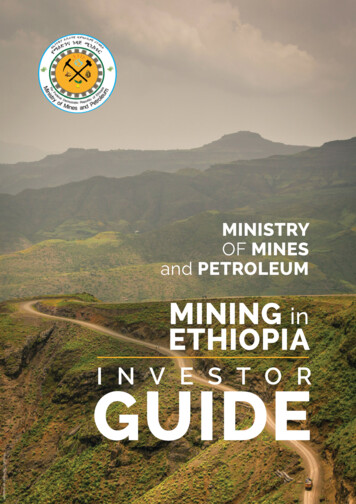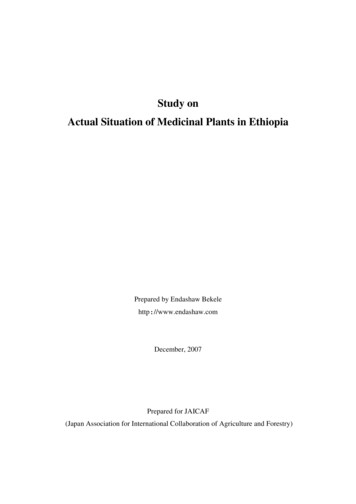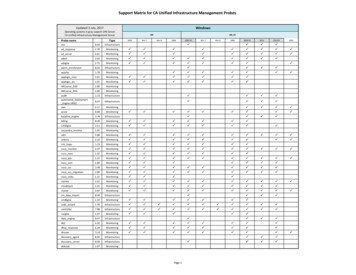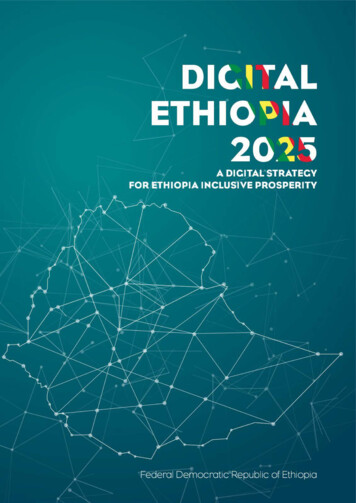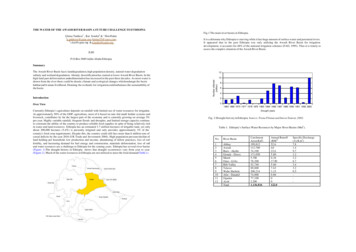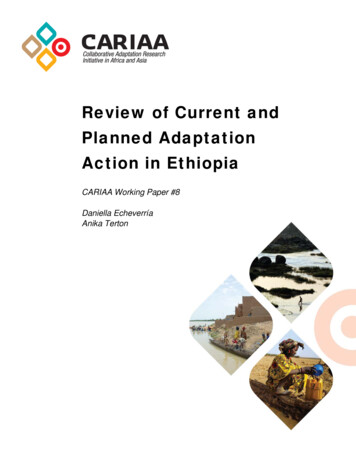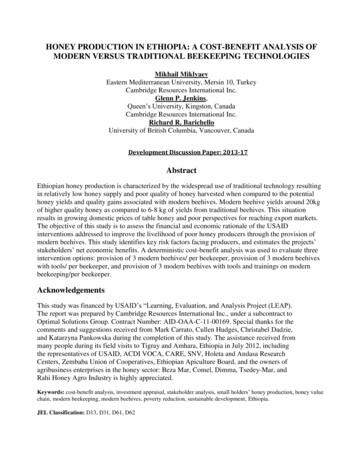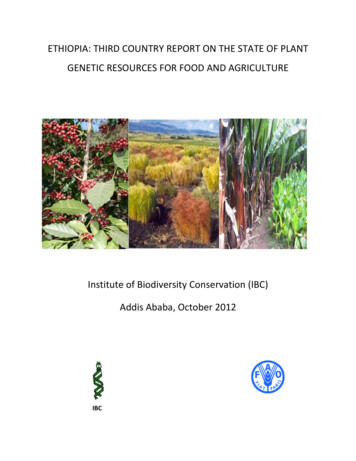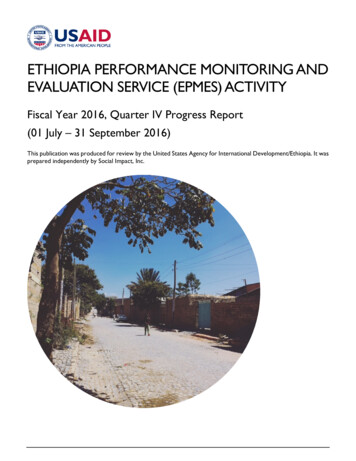
Transcription
ETHIOPIA PERFORMANCE MONITORING ANDEVALUATION SERVICE (EPMES) ACTIVITYFiscal Year 2016, Quarter IV Progress Report(01 July – 31 September 2016)This publication was produced for review by the United States Agency for International Development/Ethiopia. It wasprepared independently by Social Impact, Inc.
ETHIOPIA PERFORMANCE MONITORINGAND EVALUATION SERVICE (EPMES)ACTIVITYFY 2016 Quarter IV Progress Report(01 July - 31 September 2016)Contracted under, AID-663-C-16-000010Prepared for: Awoke Tilahun (COR) and Kai Beard A/CORUnited States Agency for International Development/EthiopiaAmerican EmbassyEntoto StreetP.O.Box 1014Addis Ababa, EthiopiaPrepared by:Social Impact, Inc.Bole Sub City, Woreda 13’House # 478, 4th FloorDISCLAIMERThe author’s views expressed in this publication do not necessarily reflect the views of the United States Agencyfor International Development or the United States Government.
CONTENTSContents . iiiAcronyms . ivGeneral Information . Error! Bookmark not defined.Background/Introduction . Error! Bookmark not defined.Detailed Description of Achievements by Results . 3Objective 1 . 3Objective 2 . 5Objective 3 . 7Objective 4 . 9Partnership and Coordination . 11Technical Assistance/STTA. 13Major Constraints/Challengs and Actions to Overcome Them . 14Issues Requiring the Attention of USAID Management . 16iiiEthiopia Performance Monitoring and Evaluation Service: Quarterly Progress Report – FY16 Q4 – Jul-Sep 2016
ACRONYMSALTAT UNGOOCAODPMPSARTSCISEUPSIOffice of Assets and Livelihoods in TransitionAID Tracker PlusBetter Potato Better LifeCountry Development Cooperation StrategyCollaborating, Learning and AdaptingCommunity-Managed Disaster Risk ReductionContract OfficerContracting Officer’s RepresentativeCatholic Relief ServicesDemocracy and GovernanceData Quality AssessmentEthiopian Center for Disability and DevelopmentEthiopia Performance Monitoring and Evaluation ServiceFood for the HungryFiscal YearGeographic Information SystemGovernment of EthiopiaGlobal Positioning SystemGraduation with Resilience to Achieve Sustainable DevelopmentHealth Financing and GovernanceHeadquartersHealth Sector Financing ReformImplementing PartnerInstitute for Security Studies AfricaInformation Systems ServicesJustice for ActionKnowledge ManagementLocal Capacity DevelopmentLocal Service ProvidersMonitoring and EvaluationMonitoring and Evaluation Capacity DevelopmentMemorandum of UnderstandingNon-governmental OrganizationOrganizational Capacity AssessmentOrganizational DevelopmentPerformance Management PlanSub Saharan Africa Research and Training CenterSave the Children InternationalStrengthening Ethiopia’s Urban Health ProgramSocial Impact, Inc.ivEthiopia Performance Monitoring and Evaluation Service: Quarterly Progress Report – FY16 Q4 – Jul-Sep 2016
SOWSPIDIISTTAUSAIDStatement of WorkStrengthening Institutions for Peace and DevelopmentShort-Term Technical AssistanceUnited States Agency for International DevelopmentvEthiopia Performance Monitoring and Evaluation Service: Quarterly Progress Report – FY16 Q4 – Jul-Sep 2016
GENERAL INFORMATIONActivity titleEthiopia Performance Monitoring and Evaluation Service (EPMES)ActivityPrime partnerSocial ImpactSub-partnersSub-Saharan Africa Research and Training (SART) Center; PRINInternational; Information System Services (ISS)Contract numberAID-663-C-16-00010Activity start dateApril 4, 2016Activity end dateApril 3, 2021 (Two base years, plus three option years)Life of Project budget 16,658,919.88Reporting periodJuly 1, 2016 to September 30, 20161Ethiopia Performance Monitoring and Evaluation Service: Quarterly Progress Report – FY16 Q4 – Jul-Sep 2016
BACKGROUND/INTRODUCTIONEthiopia Performance Monitoring and Evaluation Service (EPMES) is an activity of USAID/Ethiopiaimplemented by Social Impact, Inc. The activity was awarded to Social Impact (SI) on April 4, 2016. Thepurpose of the activity is to provide monitoring and evaluation (M&E) services to the Mission. Theobjectives of EPMES are to:1. Provide external evaluation services—including impact and performance evaluations, as well asassessments—to USAID at the project design stage (Project Appraisal Document development)and multiple implementation levels (e.g., activity, project, etc.) and in all sectors in which theMission works;2. Provide performance monitoring technical support services to the Mission to strengthenevidence-based decision-making for project design and implementation of developmentprogramming;3. Improve and enhance the capacity for learning and adaptation within USAID/Ethiopia throughoutthe program cycle;4. Strengthen local partners’ technical and management capacities, ensure sustainability,and improve knowledge of USAID policies, regulations, and practices related to M&E in order toincrease the pool of potential M&E service providers for USAID and other donors in Ethiopia.In this report, the EPMES team describes the progress in implementation of tasks that were planned to beaccomplished during Q4, FY2016. We have also listed planned activities for the next quarter under eachobjective with the caveat that these tasks are tentative as the EPMES work plan is due for revision in Q1,FY2017.2Ethiopia Performance Monitoring and Evaluation Service: Quarterly Progress Report – FY16 Q4 – Jul-Sep 2016
DETAILED DESCRIPTION OF ACHIEVEMENTS BY RESULTSObjective 1: To provide external evaluation services including impact andperformance evaluations, as well as assessmentsThe tasks under this objective will achieve two major outputs which aim to accomplish performance and impactevaluations, and special studies or assessments. The main tasks accomplished during Q4, 2016 reporting periodare described below.Output 1.1 External performance and impact evaluations, and specialstudies/assessments conductedDuring the reporting quarter, EPMES received four performance evaluation statements of work (SOWs) fromUSAID/Ethiopia: Mid-term performance evaluation, Health Sector Financing Reform/Health Sector Governance(HSFR) Mid-term performance evaluation, Strengthening Ethiopia’s Urban Health Program (SEUP) Mid-term performance evaluation, Strengthening Human Rights Protection and System of GoodGovernance Project Final performance evaluation, Graduation with Resilience to Achieve Sustainable Development(GRAD).Since inception, EPMES has received a total of eight SOWs, including three SOWs received at the end of theprevious quarter (Ethiopia Gender Analysis, Trends Analysis, and Youth Potential Baseline, Mid-term andCohort Study), and one received in October 2016 (Final Performance Evaluation of Community-ManagedDisaster Risk Reduction - CMDRR Project).AchievementsReview of Statements of Work. In collaboration with USAID/Ethiopia, the EPMES team reviewed and providedcomments and suggestions for additional refinement of the SOW. The EPMES team also met with thecorresponding USAID/Ethiopia technical offices and the EPMES Contracting Officer’s Representative (COR),to discuss the suggestions, comments, and ultimately to finalize the SOWs.Recruitment of Consultants. During the quarter, EPMES recruited 18 1 (12 males, 6 females) consultants out ofwhich 12 are local and six are international.Start-up of Evaluation Tasks. As per the EPMES work plan, seven evaluations and assessments were scheduledto start during the reporting quarter. However, all except the Trends Analysis task, were pushed to begin inthe first or second quarters of Fiscal Year 2017. The main reasons for postponing some evaluation tasks are: Difficulty in hiring consultants with combined qualifications in evaluation and the subject matterexpertise USAID/Ethiopia’s request to push back some evaluations due to the unstable security situationBelow is a detailed description of the status of each evaluation task:1This figure does not include 2 SI staff members one serving as a Team Leader for the Youth Potential Evaluation and the other one serving as aTeam Member for the Ethiopia Gender Analysis; the figure also does not include recruitment process efforts made for mid-term evaluations of theHSFR and SEUP projects.3Ethiopia Performance Monitoring and Evaluation Service: Quarterly Progress Report – FY16 Q4 – Jul-Sep 2016
1. Trends Analysis: EPMES, in collaboration with USAID/Ethiopia, identified the Institute for SecurityServices Africa (ISS-Africa) as the subcontractor for the Trends Analysis. SI, ISS-Africa andUSAID/Ethiopia discussed and finalized the SOW for the Trends Analysis, which includes a workshopthat will take place in Addis Ababa during the last week of October 2016. The Trends Analysisworkshop will be linked to a Scenario Planning workshop that will be conducted by the USAID GlobalDevelopment Lab. More details on these two workshops will be included during next quarter’s report.2. Ethiopia Gender Analysis: During the reporting period, the SOW for gender analysis was finalized.The EPMES team recruited one team leader and two additional experts (one international and onelocal). In addition, one member from the EPMES field office joined the Gender Analysis team.3. Youth Potential Baseline Evaluation: The evaluation team for this task was formed. An evaluationdesign report was prepared describing plans for a baseline evaluation, cohort study, mid-termevaluation and performance monitoring and data system review. The first team planning meeting wasconducted on September 29, 2016. The in-brief and data collection will be conducted in the firstquarter of the 2017 fiscal year.EPMES submitted for approval a list of consultants for the Youth Cohort Study. The consultants werenot approved and recruitment of alternative consultants is in progress.4. Mid-term performance evaluation of Strengthening Human Rights Protection andSystem of Good Governance Project: A Team Leader and three local consultants were recruitedand approved by USAID/Ethiopia. Preparation of the evaluation design report was completed.However, at the time of writing of this report, further discussions on the SOW were taking place withUSAID and the DG office. The details of those discussions will be included in the next quarterly report.5. Final Performance Evaluation of Graduation with Resilience to Achieve SustainableDevelopment (GRAD): EPMES held discussions with the Office of Assets and Livelihoods inTransition (ALT), to determine the general scope of this evaluation, overview of the project, theevaluation objectives, and the evaluation methods. During the reporting period, EPMES and USAIDfinalized the SOW, and EPMES recruited the evaluation team. EPMES also issued a task order to itssubcontractor, Sub Saharan Africa Research and Training Center (SART), to conduct data collectionfor the survey component of the evaluation. The work is scheduled to start in mid-October 2016.6. Midterm Performance Evaluation of Health Sector Finance Reform (HSFR)/HealthFinancing and Governance (HFG): EPMES discussed the SOW of the HSFR midterm evaluationwith the USAID/Ethiopia Health Office team, and with Abt Associates program and management staff.Recruitment for consultants was initiated, however, USAID requested that this evaluation bepostponed to January 2017.7. Midterm Performance Evaluation of Strengthening Ethiopia’s Urban Health Program(SEUP): EPMES received the SOW for the midterm evaluation of the SEUP. EPMES andUSAID/Ethiopia reviewed the SOW, however, this task was suspended temporarily until March 2017.4Ethiopia Performance Monitoring and Evaluation Service: Quarterly Progress Report – FY16 Q4 – Jul-Sep 2016
Output 1.2. Database of qualified international, regional and national organizations andindividual experts developed and updated.AchievementsDatabase Submission: EPMES submitted a first draft of the database of qualified international, regional andnational organizations and individual experts to USAID, as per the schedule of deliverables in the EPMESContract. EPMES obtained information about evaluation organizations and individual consultants using differentsources, such as Social Impact’s Taleo Recruitment Database, American Evaluation Association (AEA),ReliefWeb and DevEx. This database will be refined and updated on an annual basis and will serve both as aresource to the Mission for identifying competent evaluation service providers as well as a source that EPMEScan refer to when recruiting consultants and evaluation firms to undertake assessments, evaluations and othertechnical services of the EPMES activity.Major Tasks Planned for Next QuarterAs per the current EPMES work plan that includes activities through March, 2017, below is a list of tasksplanned for execution in the following quarter: Youth Cohort StudyCompletion of data collection and report writing for the Gender AnalysisContinuing working on Trends Analysis for the CDCSConducting Performance Evaluation on “Strengthening Ethiopia’s Urban Health Extension Program”Finalizing the Mid-term Performance Evaluation on “Enhancing the Status of Human Rights Protectionand Systems of Good Governance in Ethiopia”Design and implementation of the Midterm Performance Evaluation on “Health Sector FinanceReform (HSFR)”Finalizing the Performance Evaluation on “Graduation with Resilience to Achieve SustainableDevelopment (GRAD) Activities”Policy Research/Civil Society Organizations RoundtableFinal Performance Evaluation of the Community-based Disaster Risk Reduction Activities - CMDRR(REVIVE and REAAP)Final Evaluation of Better Potato for Better Life (BPBL)Objective 2: Performance Monitoring Technical Support ServicesUnder this objective, EPMES planned to accomplish four key outputs: (i) provide M&E capacity strengtheningto USAID/Ethiopia and its partners; (ii) Provide USAID/Ethiopia and its partners support with use of theGeographic Information System (GIS) and AID Tracker Plus (AT ); (iv) Assist USAID/Ethiopia and its partnerswith Monitoring and Evaluation Plan (MEP) design, revisions and updates; and (iv) Improvement of data qualitymanagement of implementing partners (IPs).Output 2.1 USAID/Ethiopia and its partners are provided with M&E capacitystrengthening supportDuring this quarter, no tasks related to output 2.1 were requested by USAID/Ethiopia, therefore, there isnothing to report on this output.5Ethiopia Performance Monitoring and Evaluation Service: Quarterly Progress Report – FY16 Q4 – Jul-Sep 2016
Output 2.2 USAID/Ethiopia and its IPs supported with GIS and AID Tracker Plus(AT ) tools utilizationAchievementsGIS Services to USAID. EPMES, through its subcontractor “Information System Service – ISS”, provides GISservices to USAID/Ethiopia. The Mission requested that a full-time staff member from ISS be based in theEPMES office to respond to on-going GIS needs and requests from different technical offices. After severalmeetings and discussions between EPMES, USAID, and ISS, a SOW was developed. The first request came fromthe ALT and Economic Growth and Transformation (EG&T) Offices, who provided the necessary spatial data(Woreda shapefiles) and project location data to start the work. ISS started organizing the datasets andpreparing draft maps. Weekly technical meetings have been scheduled to closely monitor preparation of eachmap, and to exchange feedback on the GIS products that are being created by EPMES and ISS.Tasks not AccomplishedAID Tracker Plus Training: EPMES did not provide support for AID Tracker Plus (AT ) during this reportingperiod. However, a request for assistance with AT training to USAID Implementing Partners (IPs) was issuedin early October, and further details will be provided during the next reporting period.Output 2.3 USAID and Partners Assisted with MEP Design, Revisions and UpdatesDuring this quarter, no tasks related to output 2.3 were requested by USAID/Ethiopia, therefore, there isnothing to report on this output.Output 2.4 Data quality management of IP activities improvedAchievementsData Quality Assessments: EPMES conducted a series of Data Quality Assessments (DQAs). A DQA orientationmeeting was conducted at the Mission on July 8, 2016, and subsequently, USAID asked EPMES to conductDQAs for the ALT Office and the Democracy and Governance (DG) Office: The work for ALT included DQAs for three IPs: CARE, Food for the Hungry (FH) and CatholicRelief Services (CRS). These DQAs took place on August 9, 10 and 18, respectively. The reportswere submitted to USAID for review. The DQA for the DG office included three IPs: Ethiopian Center for Disability and Development(ECDD), Justice for Action (JFA) and Strengthening Institutions for Peace and Development(SIPEDII). These DQAs took place on September 15, 19 and 22, respectively. Three reports weredrafted, and at the time of this report, were going through an internal review before submission toUSAID.Performance Monitoring and Data Review of “Building the Potential of Youth Activity”: The EPMES team completedthe performance monitoring and data review of “Building the Potential of Youth Activity”. An internationalconsultant and one member of the EPMES team were engaged in this activity, and worked closely with the Savethe Children International (SCI) staff and its sub-partners. The task was undertaken from September 13-23,2016, and a report on findings will be written in Q1, 2017.Some of the work done under this task included: Visiting SCI and all sub-partners Interviewing SCI and its staff at their head offices and in the field Reviewing data in the head office and in the field6Ethiopia Performance Monitoring and Evaluation Service: Quarterly Progress Report – FY16 Q4 – Jul-Sep 2016
Reviewing soft copies of project documents provided by the prime and sub-partners. Conducting field visits to interview staff and make onsite observations of the activity’s performanceoutputs and outcomes Participating in the preliminary findings presentationMajor Tasks Planned for Next QuarterAs per the current EPMES work plan that includes activities through March, 2017, below is a list of tasksplanned for execution in the following quarter: Facilitation for Mission Evidence Based Strategic discussionsConduct Orientations on USAID policies for its implementing partnersM&E system review and technical assistance to IPsSupport USAID and its partners with data collection of cross-cutting indicatorsProvide training/mentor and support on GIS and Global Positioning System (GPS) to USAID/Ethiopiaand its IPsProduce map products: maintaining and updating Geo-Meta databases for use by USAID and partnersAssist the periodic review and refinement of the Mission-Wide Performance Management Plan (PMP)and M&E plans at project and/or activity levels.Facilitate indicator refinement sessions for the Food for PeaceAssist revision of Mission Results Framework and PMP for the new CDCS developmentSupport USAID/Ethiopia and its partners with Data Quality AssessmentsObjective 3: Improved capacity for learning and adaptingEPMES hired a Learning and Adapting Advisor at the end of July 20l6. EPMES shared a concept note withUSAID, detailing the activities of our work plan that fall under this objective. USAID asked EPMES to focus itsobjective 3 efforts on assisting the Mission with the development of its next generation Country DevelopmentCooperation Strategy (CDCS 2.0). As such, most of the collaborating, learning, and adaptation (CLA) activitiesunder this objective were put on hold until subsequent quarters.Support for the CDCS developmentAchievementsUSAID/Ethiopia CDCS 2.0 Development Support Activities: EPMES and USAID began discussions on the CDCS 2.0development process in late August 2016. After a series of meetings, USAID asked that EPMES facilitate aCDCS Kick-Off Meeting for all USAID staff. The main purposes of the meeting are to: Reflect on the Mission’s previous strategy and progress thus far; Assess changes in country context and trends that will impact programming moving forward; Identify and prioritize the critical problems and underlying challenges to development in Ethiopia; and Outline next steps to developing the Mission’s next strategy.The meeting took place on October 5 and 6 and details on the meeting outcomes will be included in the nextquarterly report.7Ethiopia Performance Monitoring and Evaluation Service: Quarterly Progress Report – FY16 Q4 – Jul-Sep 2016
Output 3.1 Identification and development of relevant knowledge agendaAchievementsIdentifying relevant local knowledge sources. EPMES identified its internal knowledge sources during thedevelopment of its Knowledge Management (KM) and Learning and Adapting (L&A) plans. The major EPMES’sinternal knowledge sources are embedded under its four contractual objectives. These include: externalevaluation services (including various assessments), performance monitoring technical support, learning andadapting, and host country M&E Capacity Strengthening. This activity will be further clarified in the revision ofthe work plan scheduled in November 2016, with a focus on identifying external sources.Identify area of collaboration and support initiatives of local associations and academic institutions affiliated inmonitoring and evaluation: The roster of local associations and academic institutions affiliated in monitoring andevaluation was developed and submitted to USAID/Ethiopia in early October 2016. Using this database, SIwill identify institutions, areas of collaboration and will start working with the them in subsequent quarters.Tasks not AccomplishedConduct the needs assessment on Organizational Development (OD) for CLA, learning and knowledge management:The CLA Maturity Matrix has not yet been released by USAID/Washington. Given this, EPMES was not ableto move forward with this needs assessment.Learning events. USAID did not request any learning events to take place during this reporting period. Thereare therefore no achievements in this areaOutput 3.2 Synthesis LearningsTasks not AccomplishedRefine Learning Approaches: The work plan does not provide enough information regarding this output. EPMESwill re-engage with USAID to clarify the exact nature of this task.Output 3.3 Disseminating LearningTasks not AccomplishedSupport the Mission in organizing periodic review meetings and learning forum with its partners and stakeholders: Noactivities were implemented under this output.Other Deliverables Under Objective 3AchievementsThe EPMES contract included the submission of two deliverables during this reporting period, that fall underObjective 3. A brief explanation of each deliverable is included below: Preparation of Knowledge Management (KM) Plan: EPMES developed and submitted a KM plan to USAIDon September 1, 2016. This plan was developed before adaptation and utilization of the CLA MaturityMatrix, and will therefore require further discussion and updates.Preparation of Learning & Adaptation (L&A) Plan: EPMES drafted the L&A plan, and at the request ofUSAID, submitted a draft version of the plan on August 29, 2016. The Mission advised EPMES not tosubmit a final version of the plan, given that it was prepared without any prior exploration of theMission’s Organizational Development (OD) needs and readiness to undertake collaboration, learning,and adapting (CLA). EPMES will be required to resubmit this plan, based on inputs from thedevelopment of the CDCS 2.0.8Ethiopia Performance Monitoring and Evaluation Service: Quarterly Progress Report – FY16 Q4 – Jul-Sep 2016
Major Tasks Planned for Next QuarterAs per the current EPMES work plan that includes activities through March, 2017, below is a list of tasksplanned for execution in the following quarter: Continue to support USAID with the development of their CDCS.Conduct the Needs Assessment on OD for CLA, learning and knowledge management.Adapt the USAID CLA Maturity Matrix for learning and knowledge management.Analyze M&E findings to integrate into the Mission programming.Select and organize learning events with IPs and USAID.Pause and reflect session with the ALT Office.Support USAID Ethiopia in periodic portfolio reviews with Government of Ethiopia (GoE)stakeholders [based on USAID schedule].Identify area of collaboration and support initiatives of local associations and academic institutionsaffiliated in M&E.Collect findings and recommendations from performance monitoring and evaluation reportsDevelop action plans for each of the findings and recommendations in collaboration with USAID andIPs.Compile key findings and recommendations.Disseminate evaluation findings, good practices and lessons learned.Avail analytic results, studies and evaluation reports, meeting notes, decisions made from learningengagements, on different communication channels.Support the Mission in organizing periodic review meeting and learning forum with its partners andstakeholders.Plan and facilitate experience-sharing events in collaboration with IPs and government counterparts[as required].Objective 4: Host-country M&E capacity strengtheningUnder this objective, EPMES envisages to undertake M&E capacity strengthening for Local Service Providers(LSPs) to sustainably improve their technical and management capacities and enhance their M&E relatedknowledge on USAID policies, regulations and practices. The capacity strengthening aims to equip a core groupof institutions with capacity to independently provide quality M&E services to USAID and other donors and toensure LSPs’ participation in and ownership of M&E processes and products. PRIN, one of EPMES’ subcontractors, is also responsible for the implementation of the intervention together with Social Impact.Output 4.1 Baseline and annual M&E capacity assessments of target LSPs, conductedusing the customized OCA toolTo achieve this output EPMES planned two tasks: organizing a consultative meeting with representatives ofpotential M&E Local Service Providers, USAID, International NGOs and other relevant stakeholders, whichwould help get inputs and define strategies for capacity building; and reviewing existing SI and PRIN tools andrefining an organizational capacity assessment (OCA) Tool tailored to EPMES needs.AchievementsThe team realized that to undertake these tasks, it was necessary to write a concept note on how to handlecapacity building. Given priority tasks under other objectives, the development of the concept note was theonly task accomplished during this quarter. Furthermore, different consultative meetings were conducted withstakeholders, including the Democracy and Governance Office of USAID and the Local Capacity Development(LCD) project implemented by Kaizen.9Ethiopia Performance Monitoring and Evaluation Service: Quarterly Progress Report – FY16 Q4 – Jul-Sep 2016
Concept note development. The EPMES team developed a concept note to define/operationalize and elaborateon the different activities and processes required to systematically implement objective 4. The concept notealso asks important questions such as: What should be the overall target? What selection criteria should beused to select the LSPs? What is the minimum capacity required? Some of the key issues described in theconcept note are presented below.1. The concept note identifies the target groups as: Registered individual consultants. Firms, organizations/ institutions engaged in provision of M&E services (monitoring andevaluation, baseline, midterm, end-term and impact evaluations), undertaking assessments/rapidappraisals, case studies, project design/proposal writing, M&E trainings and data qualityassessment/audit) for USAID, other donors, governmental and non-governmental organizations.2. The concept note will be shared with PRIN for further review and refinement before it is presentedduring the consultative meeting, which is planned to take place during the next quarter. A Statementof Work has been prepared and shared with PRIN, to help EPMES enrich the draft concept note,develop a plan for co-facilitating the consultative meeting and capture input, and prepare a detailedroad map and plan for objective 4.3. EPMES recommends agreeing with USAID on a manageable target of LSPs that can be included in thecapacity building pool, which is realistic (in terms of cost and time) and manageable (in terms of annualtarget size). In the next quarter, EPMES will hold consultative meetings with USAID to better definethe target LSPs.Tasks not AccomplishedOrganize an initial consultative meeting, review existing SI and PRIN tools, and refine an OCA Tool ta
Ethiopia Performance Monitoring and Evaluation Service (EPMES) is an activity of USAID/Ethiopia implemented by Social Impact, Inc. The activity was awarded to Social Impact (SI) on April 4, 2016. The purpose of the activity is to provide monitoring and evaluation (M&E) services to the Mission. The objectives of EPMES are to:
